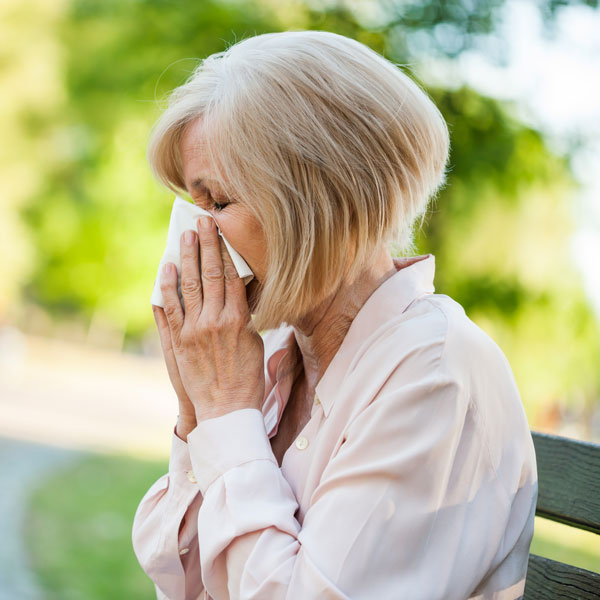Nasal Allergies & Hay Fever
Nasal Allergies & Hay Fever
Langford Allergy offers comprehensive treatment for patients suffering from nasal allergies and hay fever. Whether your allergies are seasonal or year-round, our experienced team will customize treatment for your specific nasal allergy condition.
Sinusitis (Rhinosinusitis)
One common form of nasal allergies is sinusitis. Allergic reactions can trigger sinusitis and keep the mucus in the sinus cavities from draining properly. Allergy testing with our professionals can identify what allergic triggers might be causing your recurring sinus infections and offer ways to combat them.
Symptoms of Sinusitis:
- Painful pressure in cheeks and forehead
- Postnasal drip, often with a bad taste
- Thick yellow-green nasal discharge
- Toothache
- Congestion
- Cough

Hay Fever (Allergic Rhinitis)
Allergic rhinitis, commonly called hay fever, is often caused by:
- Pollen
- Pet dander
- Mold
- Dust mites
- Cockroach particles
Hay fever is characterized by irritating symptoms in the nose, throat, eyes, ears, skin, and roof of the mouth. Contrary to its name, hay fever is not a fever—it is an allergic reaction to the certain triggers listed above. Hay fever can be seasonal, meaning you experience it only during certain allergen-heavy seasons, or you can have allergic rhinitis all year round.
Enjoy an Allergy Free Life! Call 478-787-4728 to Schedule an Allergy Test.
How Do I Know I Have Hay Fever?
Patients can often mistake hay fever for a common cold or sinus infection. That’s why it’s important to pay close attention to your symptoms and schedule an appointment at Langford Allergy if you believe you could have allergic rhinitis.
Symptoms of hay fever can include:
- Congestion
- Coughing
- Dark circles under the eyes
- Runny nose
- Sneezing
- Watery, itchy eyes
Hay Fever Treatments
Before treating your allergies, we’ll perform an allergy test to determine which allergens your body reacts to. An allergy test can comprise of a skin test or a blood test, and the process is quick and easy with minimal discomfort.
Once we determine which allergens are causing your allergic rhinitis, we will help you develop a treatment plan and teach you how to follow it. Common treatments for hay fever include:
- Antihistamines
- Decongestants
- Eye drops
- Immunotherapy
- Medications
- Nasal spray
- Steroids
Immunotherapy for Hay Fever
Immunotherapy, also called allergy shots, is a preventative allergy treatment that teaches your immune system to stop reacting to an allergen. Sublingual immunotherapy accomplishes the same goal through a tablet placed under your tongue. This is not only an effective treatment for allergic rhinitis, but it is also the only way to successfully treat the cause of your allergies and reduce the number of allergy medications you rely on.
